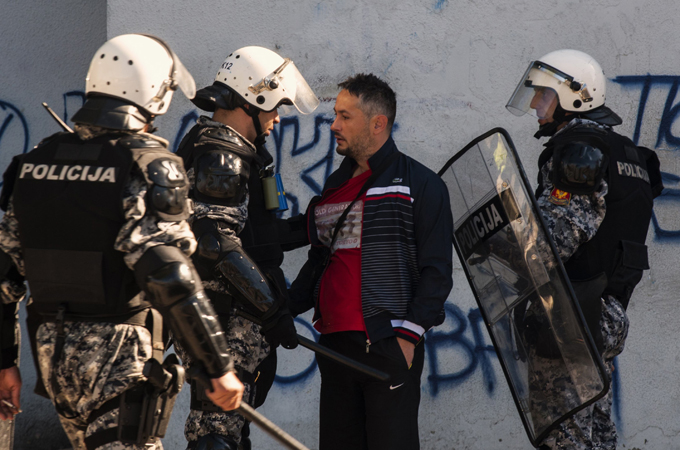Montenegro’s gay pride march sparks violence
Heavy police guard provides security for dozens of marchers as EU-hopeful Balkan state aims to improve rights record.

Police have used tear gas against dozens of rock-throwing opponents as about 150 Montenegrins succeeded in staging a gay pride march in the country’s capital for the first time.
The march, guarded by almost 2,000 police officers, took place on Sunday afternoon in Podgorica, the capital of the staunchly conservative Balkan state. The violence occurred when the attackers tried to push through cordons of hundreds of police.
We were up against enormous challenges but we did it .... Fromthis day we are no longer invisible.
Such pride marches are seen as a test of Montenegro’s commitment to human rights as it seeks to join the European Union. The half-hour walk through the centre of Podgorica was the second attempt to hold a gay pride march in Montenegro, a mountainous country of 680,000 people which began EU accession talks last year. Gay rights opponents attacked a similar march in July in the coastal town of Budva.
This time streets were cordoned off and uniformed policemen were deployed on the roofs of nearby buildings while a police chopper hovered above the scene. March organiser Danijel Kalezic says the protection allowed about gay activists to walk peacefully through the city of Podgorica.
“We were up against enormous challenges but we did it …. From this day we are no longer invisible,” said Kalezic, who is the head of Queer Montenegro group. “This was the first Pride and every year there will be more and more of us.”
The small column of gay rights supporters, including a number of human rights activists and journalists, carried banners that read “These streets belong to us, too” and “Everyone has their own right”.
 |
| Rock-throwing gay rights opponents were stopped by the police [Reuters] |
Gay pride marches are now routinely held in Montenegro’s Adriatic neighbour Croatia, which joined the EU in July, but same-sex rights remain stifled in the conservative, patriarchal societies of most of the Balkans.
Montenegro hopes to be the next in line for EU membership after Croatia. Before joining, it must demonstrate readiness to protect human rights and the government has passed a bill against all kinds of sexual discrimination.
However, the popular mood remains largely anti-gay. In a survey by several local researchers last year, 71 percent of Montenegrins said they thought homosexuality was an illness and 80 percent said it should be kept private.
The powerful Orthodox Bishop Amfilohije Radovic had asked the organisers of what he termed “The Parade of the Shameless in Podgorica” to cancel the event.